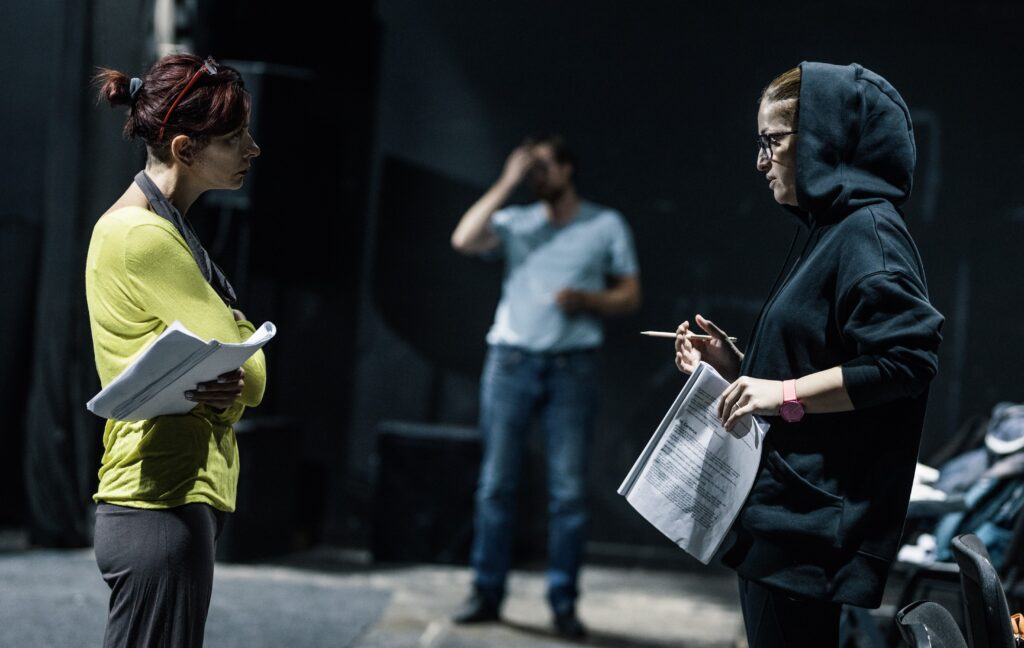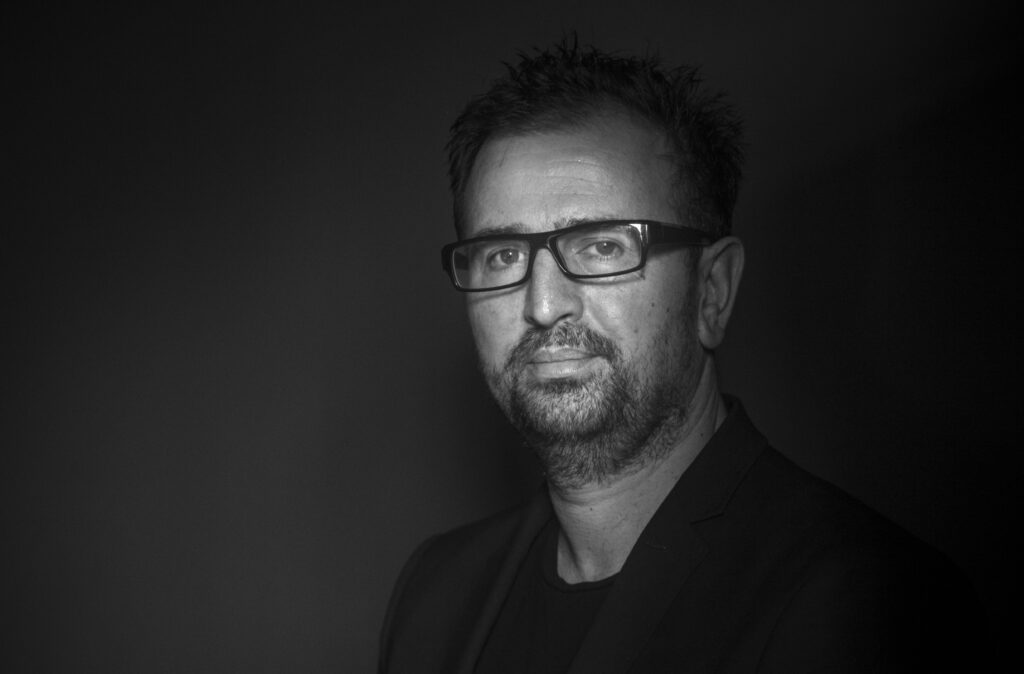Nick Awde speaks to playwright Jeton Neziraj, director Blerta Neziraj and actor Orest Pastukh about their timely new international coproduction exploring peace negotiation processes.
Written by Jeton Neziraj and directed by Blerta Neziraj, Balkan Bordello, The Handke Project and now Negotiating Peace are dramatic works that expertly blur the lines between activism and entertainment. They form part of a string of provocative plays from Kosovo that refuse to compromise on their Balkans identity and agenda and yet manage to resonate with audiences far beyond the region. But applying hard-nosed geopolitics to universal audiences while not losing the artistic statement isn’t as easy as it looks. It’s a fine balance that’s not often achieved in theatre for all its universality – and the team at Prishtina’s Qendra Multimedia make it look deceptively easy.
The themes, for starters, are eclectic but undeniably huge – and Negotiating Peace, the latest play from writer Jeton Neziraj, picks up on the trajectory of the multiverse explored through his previous plays. “If Balkan Bordello talks about a society that comes out traumatised by the war to undergo self-destruction, and The Handke Project talks about the ethical limits of literature and artistic creation, then Negotiating Peace confronts us with the efforts that societies in conflict make to restore normality and establish peace.”
Negotiating Peace takes a deep dive into the dynamics of the peace negotiation process, asking whether politicians have the right to make decisions on the behalf of the people, and what are the chances of the people reconciling after an ‘act of peace’ being signed on their behalf? The play therefore takes as its starting point two existing texts: The General of the Dead Army (Gjenerali i ushtrisë së vdekur), the 1963 novel by Albanian writer Ismail Kadare, is a much-adapted imagining of different sides looking for their fallen long after the Second World War’s end in Italy. Then there is the 1998 memoir To End a War, by American diplomat Richard Holbrooke, which documents his central role in bringing together the Dayton Agreement of 1995 that ended the Bosnian War and created Bosnia and Herzegovina. The play also brings into the mix agreements such as those for Northern Ireland and the Middle East (the title is shared with Dutch specialist Sven Koopmans’ 2018 peace process guide) and looks ahead by imagining how the end of Russia’s war on Ukraine may take shape.
Of course the current impasse between Kosovo and Serbia is also addressed, a subject that visibly runs through Jeton’s work. “As the saying goes, war doesn’t end when you lay down your arms,” he says, “and this is exactly what Kosovo has been going through for years. We live in an ‘interim state’, which is neither war nor a full-fledged peace. Peace negotiations are like an extension of war – they are necessary, but on the other hand, when they are led by those who caused the past wars, I fear they will fail. The animals of war and blood can never become the angels of tomorrow.”
And yet, using weighty sources like To End a War and the terminology of other agreements and accords means that a huge amount of baggage probably needs to be thrown away in order to make recent history accessible even to audiences within the region. “That has been one of the biggest challenges for me when writing the play,” admits Jeton. “How could I create a parable which refers to specific conflicts like the Former Yugoslavia and a conference like Dayton while giving a broader, universal picture of other peace negotiations and conflicts? Can such a parable work for audiences in the Balkans, in the Middle East, in Northern Ireland or anywhere else in the world where people can see a play like this that projects towards the end of the current war in Ukraine?”
As with war, any peace process is unlikely to follow whatever path is planned for it, and Jeton says that To End a War has helped him in understanding the unpredictable and often bizarre sides to negotiations. “We think peace agreements are signed after experts have negotiated and improved each detail, but in reality Dayton or the Oslo Accords [between Israel and the PLO] demonstrate to us that agreements are so often not the fruit of highly structured negotiations but the will of individuals at a certain moment, or that agreements can happen simply due to pressure from the peace mediators, as in the case of Dayton.”
As Jeton’s regular collaborator, solving the puzzle of matching text and ideas to produce a concept like this is a challenge that Blerta Neziraj knows well. “Jeton’s plays are unpredictable – he always says that the topic dictates his style and genre, and I believe that to be true. So, after a ‘post-drama’ like The Handke Project, he wrote Gadjo (Young Europeans) [‘gadjo’ is the Romani term for someone who is not Roma], a play that more closely resembles an operetta, and now we have Negotiating Peace, an epic narrative where realistic dialogue blends with dreamy scenes. I try as early as possible to have a general idea of how a play by Jeton is to be conceived stagewise, but this is not always possible and I often have to follow my immediate intuition. As I say every time about the latest play I work on: this is the hardest work process I’ve had so far.”

Ema Andrea and Blerta Neziraj. Photo: Sovran Nrecaj
Blerta’s instinct is to take the format far from any expected straight-ahead staging, which helps Jeton in avoiding the genres that we might expect to explore the complexities of conflict and geopolitics. “It may be creative arrogance, but the docudrama and the testimony play have never appealed to me. However, I am not suggesting that theatre should be detached from reality and perceived as a utopian space or religious shrine. I’m just saying that theatre should remain a space where we project a new reality, a ‘fictional reality’, through which we exercise democracy and where we collectively educate our feelings of empathy.”
A defining decision has been to write the play in English, performed by a team assembled via an international call by Qendra for actors and creatives. The result is a pan-European ensemble from Kosovo, Ukraine, Serbia, Bosnia and Hercegovina, Italy, Czech Republic, Albania, North Macedonia, Norway, Poland and Estonia. “The decision for an international cast is not just mine,” points out Blerta. “This is an international co-production by several theatres from Europe, and so it is understandable that they also want to be included artistically in the production. Certainly in plays like Negotiating Peace, this kind of international composition of artists and creatives is entirely justified.”
Adds Jeton: “In fact many of our plays have been co-produced with other theatre partners across Europe. Engaging and exchanging with international artists is one of the ways how we understand theatre.”
Blerta appreciates the benefits of taking on such a challenge, because “I am faced with different worldviews about the theatre, with different approaches to performance and so on. So the creative process of staging goes hand in hand with the fusion of the work methods, approaches and theatrical convictions of everyone there.”
Something common to virtually all the cast and creatives is a shared past from Communist Europe, most evident in Ukrainian actor Orest Pastukh. “I got into the project thanks to my Prague director Daniel Přibyl who suggested I apply to take part, given not only the relevance of the play’s subject for me personally and my country but also for the Czech Republic, which is one of the pioneer countries in supporting Ukraine. For the Czechs, the Russian invasion is highly relevant in view of their experience of the Soviet occupation as well as within the context of the security problems of the countries of Eastern Europe after the collapse of the USSR.”
Given his perspective as a Ukrainian, does Pastukh see Negotiating Peace having different impacts on audiences in the Balkans and in Western Europe? “For me and for Ukrainian society the subject of peace negotiations is painful, because our war is still happening and the thought of any contact with the aggressor is traumatising, especially at a time when the Russians are trying to promote the narrative of them as ‘victims’. But we understand that in the future a peace process is inevitable as the logical end to hostilities.
“The value of this project is that it vividly shows the ambiguities of the processes that take place behind the closed doors of diplomatic talks. For Balkan audiences – as well as for Ukrainian audiences in the future – this will be an opportunity to talk about their experience again, so it is a work that also deals with the trauma of war.”
For audiences beyond the region, he sees Negotiating Peace as a timely introduction to the Balkan/Ukrainian experience that will give people a better understanding. “I would like to see the feedback and understanding in every country and platform where we perform the play and where we can discuss it.”
Blerta says she would have made a different work if it was aimed solely at Kosovan audiences. “There are always elements that make a production of this type different from a play that is focused only on the local audience. The most obvious element is the fact that the play is performed in English, with actors from different countries – but I always try to avoid using codes, signs, symbols and references that are purely local.”
This attitude, she explains, also directs Jeton’s scripts. An earlier draft of Negotiating Peace, for example, involved a scene where the parties had to negotiate which system of car plates was to be adopted. “That scene was making a clear reference to an issue in the current negotiations between Serbia and Kosovo, a topic that has become almost a farce for us. However, we dropped it because we understood that only audiences in Kosovo and Serbia would get the connection.
“But working with such multinational teams of artists who come from different cultures and countries, who have different backgrounds and worldviews for the theatre, this is enriching for the development of the story, because a diverse team can filter each local reference and its meaning for wider audiences.”

Jeton Neziraj. Photo by Majlinda Hoxha
From Jeton’s viewpoint, the idea of local circles in parallel orbit with the idea of international. Plays like The Handke Project and Negotiating Peace take as their starting point the foreigners/outsiders, the external forces, that influence the tide of events in the region. Conversely, the region’s peoples end up as passive partners at the table – or they are simply not invited. “These ‘external forces’ that you describe, we call them simply ‘internationals’ and they call us ‘locals’. This power relationship, the prejudices, misunderstandings and ‘crises’ between locals and internationals are central to my thinking. I have dealt with them in many of my plays – one even has the title of The Internationals, which deals exclusively with this international-local relationship which I believe has post-colonial roots. Let us not forget that Kosovo as a country is an international product – created first of all by America and Europe.”
How local then can the international artist be? In answer, Pastukh points to the unstoppable merging of information at all levels on the web and social media. “It sounds strange, but in the 21st century with all the information we have available, the concept of truth remains so vulnerable. Hybrid warfare involves the manipulation of information, and just as artillery destroys cities, so propaganda destroys the brains of those who cannot withstand it or are deprived of receiving more information. This applies to countries with military conflicts but we can see that the problem is far wider.
“The narrative of truth has a special price and so it’s important for the artist to talk about it as part of the conversation that needs to become an important counter-argument against propaganda, populism and lies. The greatest insidiousness of any propaganda is that it always makes you complicit in its crime without your consent, and as artists we need to speak about this from our own experience loudly and often.”
Negotiating Peace is a good place to start to hear those voices speaking loudly, voices that resonate with the truth and conviction of shared lived experience. “Coming from such a poor and isolated country,” says Jeton, “–and let us remember that Kosovars are the only Europeans that need a visa to travel to Europe – this exchange and interaction with other European theatre artists and partners is not just an artistic act but also a political act. And not only for us in Kosovo. In these times where we see increasing xenophobia and racism in Europe with the rise in nationalism and authoritarianism, then cultural exchange and cooperation in Europe is a political act.”
Negotiating Peace premieres at Oda Theatre in Prishtina on 16th October ahead of an international tour.
Further reading: The Handke Project: “Peter Handke is a product of the times in which we live”
Nick Awde is a journalist, playwright, editor, critic and producer. Based in the UK, he is co-director of Morecambe's Alhambra Theatre. Books include Equal Stages (diversity and inclusion in theatre), Mellotron, Women In Islam, and translations of plays by other writers. Much of his work focuses on ethnoconflict and language/cultural genocide.








